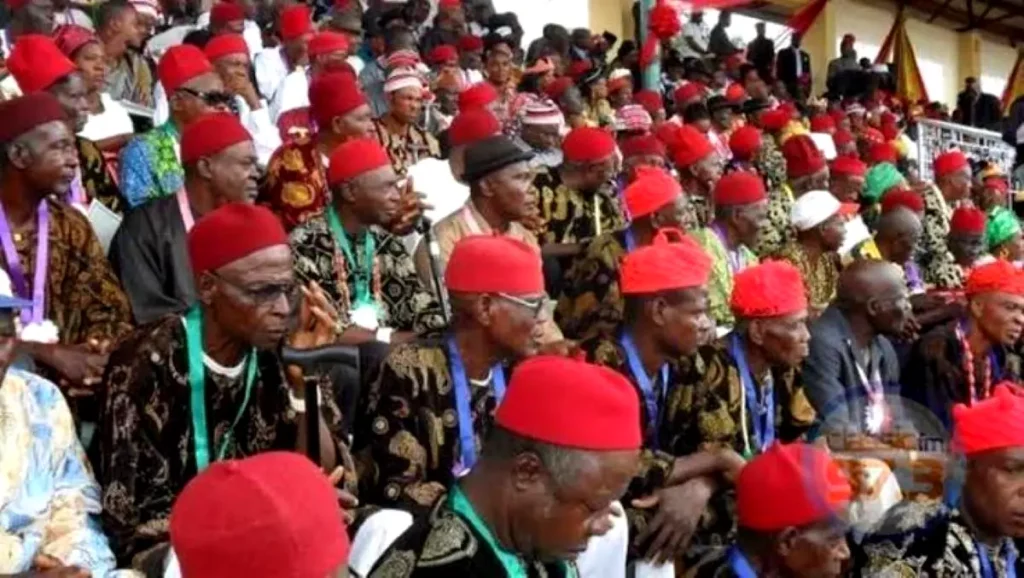Stephen Ukandu, Umuahia
The apex Igbo socio-cultural organisation, the Ohanaeze Ndigbo Worldwide, has inaugurated a committee to organise this year’s World Igbo Day.
According to a release by the National Publicity Secretary of Ohanaeze, Dr Alex Ogbonnia, the event to be hosted in Enugu State, is scheduled for September 29.
The choice of Enugu as venue for the annual event “is because, apart from being the Igbo capital, it offers the required ambience, cultural hospitality, peace and security.”
It gave the theme of the 2023, Igbo Day, according to the LOC as “Igbo Kunie.”
The statement read in part: “The logic behind this theme is that it is a clarion call for the Igbo to arise and fulfill their lofty destiny; a charge for the Igbo to awaken to the philosophy of Akuluo-uno; to galvanise Ndigbo towards unity; to rediscover and embrace our core traditional family values of one in brotherhood; to have a rethink on the security situation in Igbo homeland and a call for Ndigbo to rise to the challenge of self-destruction through the sit-at-home syndrome.
“The Igbo Day Celebration is in commemoration of some remarkable events that have impacted the Igbo history. The Igbo Day is rather a chain of events that have been compacted into one, and observed on September 29, every year.”
Members of the Local Organising Committee (LOC) according to the statement include: Professor Fred O. Eze (Chairman); Malachy Chuma Ochie (Secretary);
Dr. Mrs Selina Ugwuoke-Adibuah (Member); Dr Chiedozie Alex. Ogbonnia (Member); and Dr Peter Aneke.
Others include, Mazi Ambrose Obioha (Member); and Chief Mrs Odibeze Amaka Anajemba (Member).
On the significance of World Igbo Day the statement said: “The reason is not only fundamental and sentimental, it is also very symbolic. A trip into history informs that Nigeria gained independence from the British on October 1, 1960; and attained a republican status on October 1, 1963.
“Unfortunately, from 1961 to 1966, several events suggested that Nigeria was still in a flux about democratic governance and even the independence itself. Some of the crises that unfolded shortly after the independence include the high level of electoral malpractices which gave rise to destruction of properties, maiming and killings in what was known as Operation Wetie of the Western Nigeria in 1962; the census controversy of 1963; creation of Midwest Nigeria, treason charges and imprisonment of Chief Obafemi Awolowo, amongst others.
“The British Commander of the Nigerian Army, Major General Christopher Earle Welby-Everard withdrew from the Nigerian Army and handed over to Major General Johnson Thomas Umunnakwe Aguiyi Ironsi in May 1965.
“Based on the foregoing crisis, a group of Army Officers widely believed to have been led by Major Chukwuma Kaduna Nzeogwu, staged a bloody coup d’état on January 15, 1966. On May 29, 1966 over 3,000 Igbos were massacred in Kano as a consequence of what was considered an Igbo coup of January 15, 1966. Two months later, July 29, General Aguiyi-Ironsi, the Head of State and Commander in Chief of the Armed Forces was killed along with his host the Military Governor of the Western Region, Lt. Col. Adekunle Fajuyi by the Northern military officers in what was tagged a counter coup.
“Several other Igbo officers were located at various military formations and killed on the same day. As if that was not enough, on September 29, 1966, another major ethnic cleansing took place in which about 30,000 Igbos were killed in the entire Northern Nigeria.
“Based on the above backdrop, the Ohanaeze Ndigbo Worldwide has set aside September 29 every year as a special day. Why celebrate the Igbo Day? One may ask. The reason is not only fundamental and sentimental, it is also symbolic.
“In the first place, it is a day of sober reflection on one hand, and a day to celebrate the Igbo resilience, ingenuity, entrepreneurial skills and frontier spirit, on the other.
“Without sounding immodest, all Nigerians affirm that the Igbo are endowed with the highest human creative potential, perhaps in the whole Africa.
“Therefore, we celebrate the innate capacity and perseverance in the Igbo to break some imposed physical boundaries to achieve incredible results where most fail. We celebrate that we passed through the valley of the shadow of death and bounced back in splendour; passed through the belly of the whale; traversed turmoil and hell and bounced back in glory.
“We celebrate the courage, tenacity and adaptability-to live and thrive in all parts of the world. We celebrate the promise of God that he fights for the oppressed and that history will vindicate the just.
How come that an ethnic group that has suffered various kinds of injustice, alienation and relative deprivations have undauntedly remained afloat in the academia, corporate world, transportation, tourism, commerce and industry, etc.?
“So, instead of mourning, we have chosen to celebrate the God’s love and kindness towards the Igbo.”

